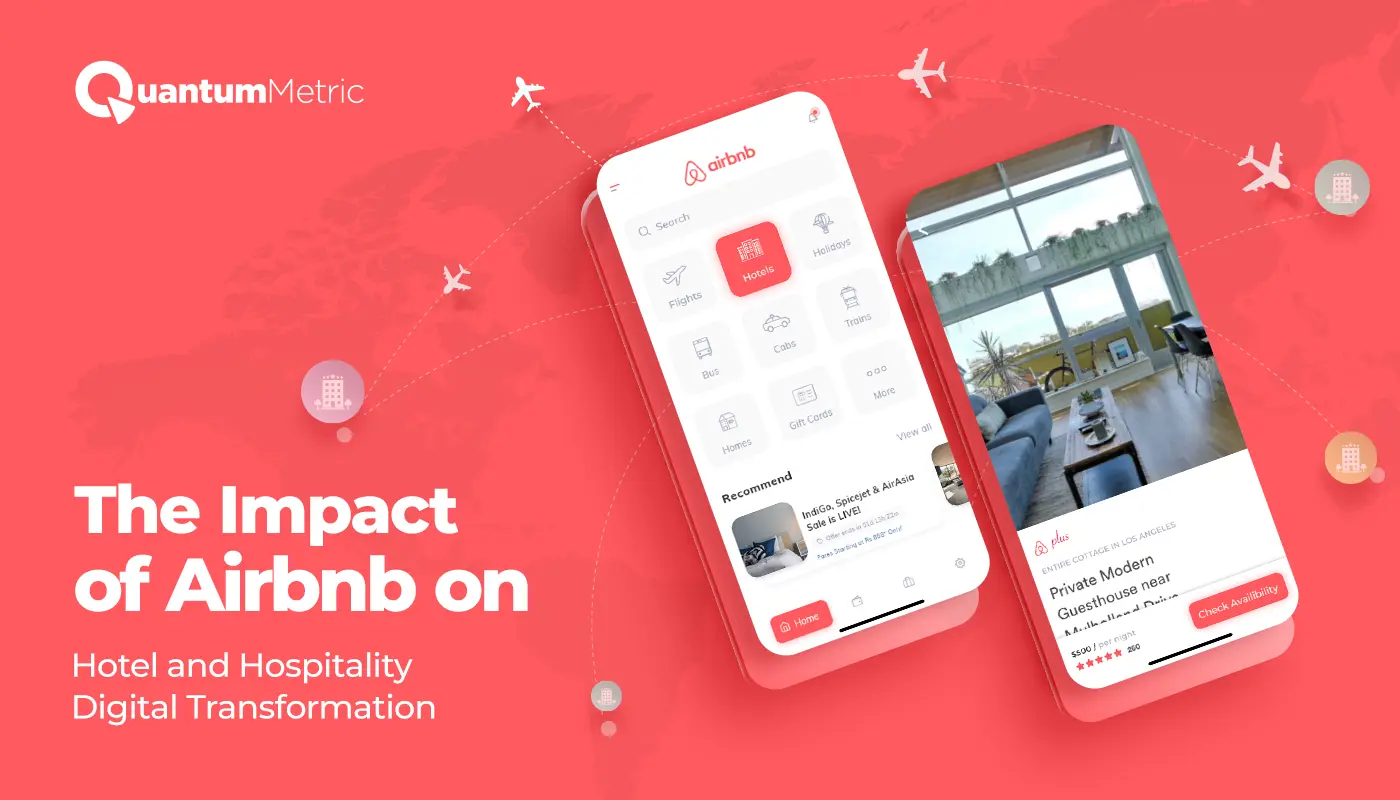The Impact of Airbnb on the hotel and hospitality industry.

When Airbnb, an online marketplace for lodging, homestays, and vacation rentals, was founded in 2008, the startup made a major splash on the tourism industry. By 2013, staying in an Airbnb formed part of the millennial lexicon. Now in 2021, Airbnb is a household name, and one of the most downloaded applications in the world. While many people have talked about the impact of Airbnb on hotel and hospitality industry, few have discussed how the application helped hotels drive digital innovation.
How Airbnb reshaped the hotel and hospitality industry.
Throughout the last decade Airbnb helped to drive tourism across the globe. Before the pandemic, more flight routes popped up due to surges in demand. Families and large groups of friends started pursuing longer trips. And more millennial and Gen Z solo travelers, with options such as Airbnb, hotels, hostels, and couchsurfing, traveled across Europe, Latin America, Asia, and elsewhere to meet other young travelers from across the globe.
It’s too soon to say how Airbnb will impact the hotel industry as tourism rebounds from the pandemic. But one can say that Airbnb has helped hotels to re-imagine digital transformation. Given that you’re not traveling during peak season or during a major event, Airbnb has allowed for unprecedented levels of personalization. Travelers can find the right place, with the necessary amenities, in the right location, whether it be a room in a New York City apartment or a private cabin for your ski trip in the mountains.
But Airbnb’s success didn’t happen overnight. The startup acquired a number of other startups to boost its personalization efforts. NabeWise, Airbnb’s first 2012 acquisition, aggregates information about specific locations to create city guides–that’s how Airbnb started offering hyper-personalized, local recommendations to tourists. Their second 2012 acquisition, Localmind, made it easier for travelers to personalize the questions they’re asking based on location.
Airbnb doubled down on digital payment methods by acquiring Tilt.com in February 2017, as well as accessibility by acquiring Accomable, once known as the Airbnb for people with disabilities, later that year. In 2019, they also acquired other booking applications, such as HotelTonight, which aggregates hotel room offerings for last-minute travelers, and Urbandoor, an online marketplace specializing in extended stays for business travelers.
What makes Airbnb special, anyway?
So what makes Airbnb unique, exactly?
To put it simply: Over 60% of Airbnb listings include entire homes, while 34% make up private rooms. However, shifts in local regulations have led to more private rooms, as more and more jurisdictions have made it more difficult for entire homes to remain on the marketplace all year.
The majority of Airbnb’s listings include small rental units in urban areas across the US, Europe, and other countries. Studios, 1 bedroom, and 2-bedroom units make up the vast majority of Airbnb listings.
Many hotels offer similar services. But in our digital-first world, that’s not always enough. As hotels rebound from the pandemic, they will need to match the quality of service offered by Airbnb’s digital ecosystem to stay competitive in the new travel economy.
Here’s a look at the impact of Airbnb on hotel and hospitality industry digital transformation. In other words, here’s what hotels can learn from Airbnb’s success.
Enhanced OTA booking experience for hotels.
Oftentimes, Airbnb wins over travelers not with their offerings, but rather by providing a standout OTA (online travel agent) booking web application experiences. Guests can search for their destination, explore nearby trips (based on their current location), and pursue categories such as “Pets Allowed,” “Unique Stays,” and “Farms and Nature.” Airbnb helps facilitate adventures, including multi-day trips with meals, and other experiences.
Airbnb’s standout user experience has made it a go-to place for many travelers to start planning their next trip, even ahead of a more generic Google search.
Airbnb has also fostered brand loyalty and recognition, which means that travelers return to the platform after their first experience to book their next trip. In fact, some hotels have started partnering with the Airbnb platform, with hotels accounting for a sizable chunk of Airbnb listings–around 15%.
Standout Airbnb-like mobile app experiences.
Airbnb’s mobile application has empowered travelers to plan trips right from the comfort of their phones. And for exhausted travelers weighed down by suitcases and backpacks, communicating with the host or getting information about check-in via their mobile device has never been more important. Because of Covid-19, touchless check-ins and less direct physical contact with hosts have been crucial selling points due to ongoing health and safety concerns.
The hotel and hospitality industry is taking note of Airbnb’s impact. Hospitality chains like Marriott are now offering services such as virtual check-in, reward programs, services tied to a specific location, and more. Mobile apps make it easier for travelers to pay bills, manage their reservations, and request add-on services that benefit the business’s bottom line.
Direct access to hosts.
Airbnb rentals are managed by a host, usually a property owner, manager, or master tenant. Through the application, travelers have direct access to their host, including their name and picture. This gives staying in an Airbnb a personal touch.
Most hotel guests, on the other hand, book through an impersonal website and arrive not knowing who will greet them.
When guests at hotels have to call down to the front desk, which can be inundated with guest requests, it can feel more impersonal and transactional. Hotels can remedy this by offering applications and websites that empower guests to effectively and efficiently communicate with staff about smaller tasks, such as room service requests. To add their own personal touch, some hotels have invested in direct messaging platforms where staff members include their name and a profile picture.
Social media presence.
Many Airbnbs are designed for the Instagram generation, and more importantly, to be photographed and shared on Instagram. The popular instagram page, Best Airbnb, collects images from stunning Airbnb and hotel rentals. With over 584K followers, the Instagram page demonstrates what travelers want: to share their beautiful travel experiences on social media.
Like airlines, Hotels have been finding innovative ways to boost digital interaction. Some hotels have offered rewards points or bonuses services for guests that share a social media post about their experience on Instagram, Facebook, or Twitter.
More photos–and a personal touch.
Airbnb listings tend to include a large number of photographs showcasing each property’s best features–especially fun quirks and cool amenities. Because the listings are usually written by the host, they also have a personal touch that reminds guests they are staying in someone’s home. Some listings have as many as 20 photographs.
Hotel rooms, on the other hand, run the risk of looking too similar, too hard to differentiate. Still, large hotels offer a wide variety of rooms, each with their own unique features and amenities. Hotels, then, can benefit by showcasing these features on their listings so that hotel guests can get excited about their hotel stay. Who doesn’t want to spend an evening in a hotel’s hot tub?
Consistency: The impact of Airbnb on the Hotel and hospitality industry’s offerings.
When thinking about the impact of Airbnb on the hotel and hospitality industry, it’s also important to consider the wide range of offerings available on the platform.
Given that Airbnb’s are usually owned and operated by individuals, families, and smaller businesses, their offerings vary widely from listing to listing. It’s a peer-to-peer rental platform, after all. Airbnb makes up for the potential drawbacks of individualization through its reviews features. Guests can confirm for future travelers that the listing matches the experience, leaving a feedback and review.
Hotels, on the other hand, deliver much more consistent experiences, which can be comforting for some travelers. At the same time, hotels need to highlight how their rooms are different by providing unique online experiences that differentiates the personality of each room and hotel.
According to Forbes, “Not every room should be the same cookie-cutter mold at the same price. They should have a modicum of personality, and a diverse set of amenities, from fully-stocked kitchens to second bathrooms to common spaces and more.”
Hotel chains, especially those with properties in urban areas, have already begun reimagining a more Airbnb-like experience, but in a hotel infrastructure. Micro Hotels, a new trend that seeks to incorporate efficient designs into the guest experience, “are small on size but big on personality.” These smaller rooms are a great fit for travelers who will be on the go and are looking for something more cost effective. They are solid options for travelers who are accustomed to staying in hostels or shared rooms in Airbnb rentals, but would prefer more privacy and a standardized experience.
If you enjoyed learning about the impact of Airbnb on hotel and hospitality industry digital transformation, learn more about the new technologies that hotels are using as they rebound from Covid-19 and double down on the digital experience.







